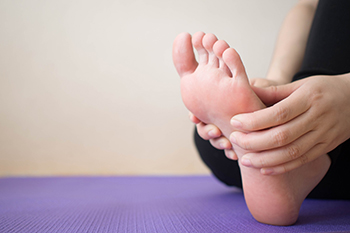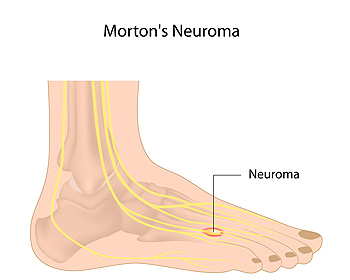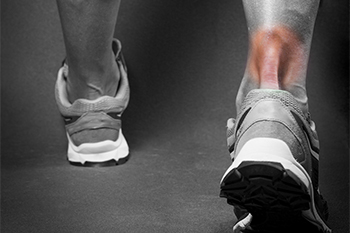Blog
Causes of Tarsal Tunnel Syndrome

Tarsal tunnel syndrome is a condition that affects the feet. It gradually happens as a result of repetitive motion, causing the tibial nerve to become irritated or compressed. This is located inside the tarsal tunnel and is accompanied by ankle pain and discomfort. Additional symptoms can include a numbing or tingling sensation, and the overall foot may feel weak. People who have flat feet may be prone to developing tarsal tunnel syndrome, or it may occur in patients who have had a previous ankle injury. A lipoma, or mass, that lies near the tibial nerve may also cause tarsal tunnel syndrome. Having unexplained ankle pain may prompt an exam to be done which can properly diagnose tarsal tunnel syndrome. This can consist of having an MRI or Tinel’s test performed, both of which are accurate tests that can confirm this diagnosis. Treatment often begins with frequently elevating the foot, and relief may be found when an elastic compression bandage is worn for support. If you have ankle pain, it is strongly suggested that you confer with a podiatrist who can diagnose and treat tarsal tunnel syndrome.
Tarsal tunnel syndrome can be very uncomfortable to live with. If you are experiencing tarsal tunnel syndrome, contact one of our podiatrists of Pennsylvania. Our doctors can provide the care you need to keep you pain-free and on your feet.
Tarsal Tunnel Syndrome
Tarsal tunnel syndrome, which can also be called tibial nerve dysfunction, is an uncommon condition of misfiring peripheral nerves in the foot. The tibial nerve is the peripheral nerve in the leg responsible for sensation and movement of the foot and calf muscles. In tarsal tunnel syndrome, the tibial nerve is damaged, causing problems with movement and feeling in the foot of the affected leg.
Common Cause of Tarsal Tunnel Syndrome
- Involves pressure or an injury, direct pressure on the tibial nerve for an extended period of time, sometimes caused by other body structures close by or near the knee.
- Diseases that damage nerves, including diabetes, may cause tarsal tunnel syndrome.
- At times, tarsal tunnel syndrome can appear without an obvious cause in some cases.
The Effects of Tarsal Tunnel Syndrome
- Different sensations, an afflicted person may experience pain, tingling, burning or other unusual sensations in the foot of the affected leg.
- The foot muscles, toes and ankle become weaker, and curling your toes or flexing your foot can become difficult.
- If condition worsens, infections and ulcers may develop on the foot that is experiencing the syndrome.
A physical exam of the leg can help identify the presence of tarsal tunnel syndrome. Medical tests, such as a nerve biopsy, are also used to diagnose the condition. Patients may receive physical therapy and prescriptive medication. In extreme cases, some may require surgery.
If you have any questions please feel free to contact one of our offices located in Plymouth Meeting and Ambler, PA . We offer the newest diagnostic and treatment technologies for all your foot and ankle needs.
Proper Shoes Can Help Prevent Running Injuries

The importance of wearing running shoes that fit properly and support the feet cannot be underestimated. Proper running shoes can protect the feet from injury, as well as other body parts such as the knees and legs. Experts suggest that while shopping for the right running shoe you keep in mind support, cushioning, and protection. First, the shoe should fit your specific foot type, taking into consideration arch problems or gait issues such as overpronation. Second, regarding proper cushioning, it is imperative that the way you run be taken into consideration. If you are a heel striker, then extra cushioning at the heel will be needed. It is also important to recognize the type of surface you will be running on because that will determine how much cushioning works best. Finally, to best protect your feet, having a medical assessment of your feet is a good idea before buying a pair of shoes. Gait, foot type, arch issues, running patterns, and previous injuries will be taken into account. For help in choosing the right running shoe, it is suggested that you make an appointment with a podiatrist.
You should always make sure your running shoes fit properly in order to avoid injury. For more information, contact one of our podiatrists from Pennsylvania. Our doctors can provide the care you need to keep you pain-free and on your feet.
Choosing the Right Running Shoe for Your Foot Type
Improper shoe sizing can cause a myriad of problems for your feet. Shoes that don’t fit you properly can lead to muscular imbalances in your body, which can result in foot, knee, and hip injuries.
Tips for Finding the Right Running Shoe
- Make sure you have a thumb’s width of wiggle room between the end of your longest toe and the front of the shoe.
- There should be little to no slipping at the heel
- Don’t assume your size in one shoe brand will be your size in another
- Do not lace up your shoes too tightly
- Walk around in the store with your new shoes before you buy them
If you have any questions please feel free to contact our one of our offices located in Plymouth Meeting and Ambler, PA . We offer the newest diagnostic and treatment technologies for all your foot and ankle needs.
What Can Cause Morton's Neuroma?

A burning pain in the ball of the foot and the feeling of having a small pebble under your foot are signs that you may have Morton’s neuroma. This condition involves a thickening of the tissue across the metatarsal nerves, causing pressure and pain. It is generally felt in the space between the third and fourth toes, and may be connected to the type of shoes that are worn. High heels with pointed toes and shoes that are too tight can cause pressure on the metatarsal joints by pushing the weight onto the ball of the foot. Certain foot deformities, such as hammertoes or bunions, can cause the weight of the body to shift onto the ball of the foot. High impact sporting activities, such as tennis and running, can place increased stress in the area. Additionally, rock climbers and snow skiers may develop Morton’s neuroma, as a result of a combination of wearing tight shoes that can exert pressure on the toes. For a diagnosis and treatment options, it is suggested that you make an appointment with a podiatrist.
Morton’s neuroma is a very uncomfortable condition to live with. If you think you have Morton’s neuroma, contact one of our podiatrists of Pennsylvania. Our doctors will attend to all of your foot care needs and answer any of your related questions.
Morton’s Neuroma
Morton's neuroma is a painful foot condition that commonly affects the areas between the second and third or third and fourth toe, although other areas of the foot are also susceptible. Morton’s neuroma is caused by an inflamed nerve in the foot that is being squeezed and aggravated by surrounding bones.
What Increases the Chances of Having Morton’s Neuroma?
- Ill-fitting high heels or shoes that add pressure to the toe or foot
- Jogging, running or any sport that involves constant impact to the foot
- Flat feet, bunions, and any other foot deformities
Morton’s neuroma is a very treatable condition. Orthotics and shoe inserts can often be used to alleviate the pain on the forefront of the feet. In more severe cases, corticosteroids can also be prescribed. In order to figure out the best treatment for your neuroma, it’s recommended to seek the care of a podiatrist who can diagnose your condition and provide different treatment options.
If you have any questions, please feel free to contact one of our offices located in Plymouth Meeting and Ambler, PA . We offer the newest diagnostic and treatment technologies for all your foot care needs.
Symptoms of an Achilles Tendon Injury

The most common reason an Achilles tendon injury can happen is overuse. Many runners experience this type of injury, possibly as a result of increasing speed and distance too quickly. Additionally, it may happen from not stretching properly before running or jogging. The Achilles tendon is located in the lower calf area and connects the heel to the calf muscles. This type of injury generally causes severe pain and discomfort and can be challenging to walk. Additional symptoms associated with an Achilles tendon injury can include stiffness, swelling, and a burning sensation. An Achilles tendon injury may cause some patients to feel weak and existing calluses on their feet may change in size. This may be a result of the impact an Achilles tendon injury can have on the skin while walking. If you have incurred this type of injury, it is strongly suggested that you consult with a podiatrist as quickly as possible who can guide you toward the right treatment methods.
Achilles tendon injuries need immediate attention to avoid future complications. If you have any concerns, contact one of our podiatrists of Pennsylvania. Our doctors can provide the care you need to keep you pain-free and on your feet.
What Is the Achilles Tendon?
The Achilles tendon is a tendon that connects the lower leg muscles and calf to the heel of the foot. It is the strongest tendon in the human body and is essential for making movement possible. Because this tendon is such an integral part of the body, any injuries to it can create immense difficulties and should immediately be presented to a doctor.
What Are the Symptoms of an Achilles Tendon Injury?
There are various types of injuries that can affect the Achilles tendon. The two most common injuries are Achilles tendinitis and ruptures of the tendon.
Achilles Tendinitis Symptoms
- Inflammation
- Dull to severe pain
- Increased blood flow to the tendon
- Thickening of the tendon
Rupture Symptoms
- Extreme pain and swelling in the foot
- Total immobility
Treatment and Prevention
Achilles tendon injuries are diagnosed by a thorough physical evaluation, which can include an MRI. Treatment involves rest, physical therapy, and in some cases, surgery. However, various preventative measures can be taken to avoid these injuries, such as:
- Thorough stretching of the tendon before and after exercise
- Strengthening exercises like calf raises, squats, leg curls, leg extensions, leg raises, lunges, and leg presses
If you have any questions please feel free to contact one of our offices located in Plymouth Meeting and Ambler, PA . We offer the newest diagnostic tools and technology to treat your foot and ankle needs.
